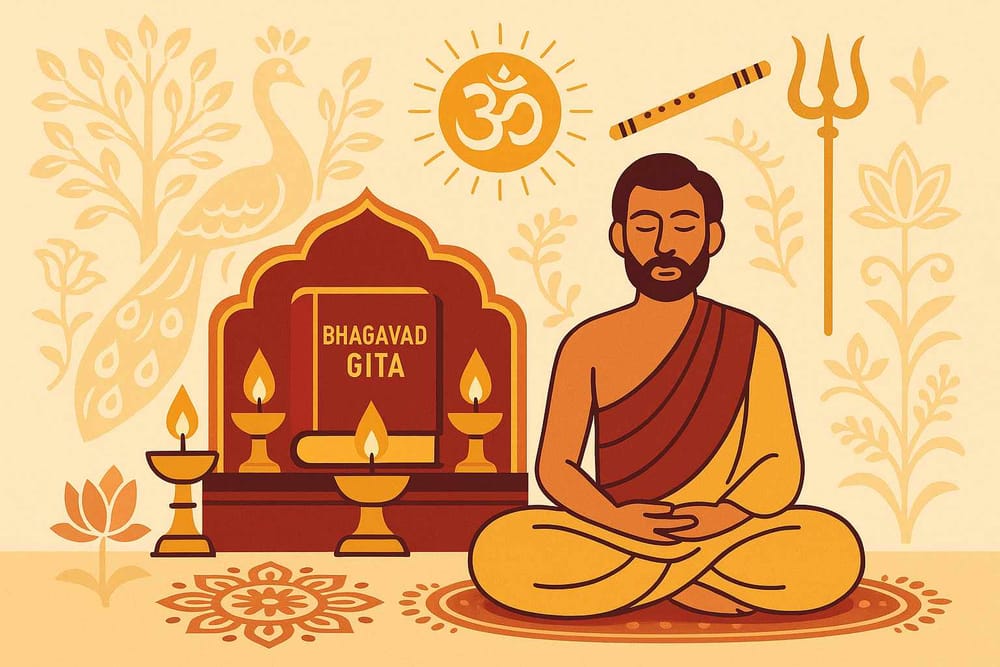
The Path of Knowledge & Devotion: Hindu Scriptures and Practices Explained
Hinduism, a way of life deeply rooted in India, beautifully intertwines philosophy, spirituality, and devotion. Within its vast framework, the paths of Jnana (knowledge) and Bhakti (devotion) stand out, offering seekers diverse avenues to connect with the divine. By delving into these paths and the scriptures that illuminate them, we can achieve a harmonious balance between intellectual understanding and heartfelt surrender.
Sacred Texts: Guiding Lights on the Spiritual Journey
Hindu scriptures are treasure troves of spiritual guidance, broadly classified as shruti ("that which is heard," revealed texts) and smriti ("that which is remembered," remembered texts). The Vedas, foundational shruti texts, comprise four parts—Rigveda, Samaveda, Yajurveda, and Atharvaveda. They delve into both rituals and profound philosophical questions, serving as essential guides for those on the path of knowledge.
At the heart of the Vedas lie the Upanishads, exploring concepts like Brahman (ultimate reality) and Atman (the individual self). Teachings like "Tat Tvam Asi" ("Thou art That") encourage seekers to realize their inherent oneness with the divine. These texts emphasize introspection and the pursuit of intellectual clarity.
The Puranas, classified as smriti, present complex spiritual ideas through captivating narratives and allegories. The Bhagavata Purana, for instance, masterfully weaves together Lord Krishna's teachings with stories of love and surrender, fostering both wisdom and devotion. These texts make spirituality accessible to all, regardless of their background.
Jnana Yoga: The Path of Knowledge
Jnana Yoga, often referred to as the path of self-realization, centers around deep introspection and the pursuit of knowledge to understand the true nature of reality and the self. It involves questioning the nature of existence and our place within it, leading to a profound understanding of the interconnectedness of all things.
Bhakti Yoga: The Path of Devotion
Bhakti Yoga, also known as the path of loving devotion, emphasizes cultivating a deep, personal relationship with the divine. Through practices like chanting mantras, singing bhajans, and selfless service, devotees express their love and reverence, strengthening their bond with the divine.
Bhaktilipi.in: Your Companion on the Path of Devotion
For those seeking to deepen their understanding of Hindu scriptures, Bhaktilipi.in offers a wealth of resources. We provide sacred texts, devotional literature, and inspiring stories, bridging the gap between ancient traditions and contemporary understanding. Explore Bhaktilipi.in and embark on a journey of devotion and timeless wisdom.
Why Choose Bhaktilipi.in?
- Learn & Grow: Dive deep into the wisdom of Hindu scriptures and practices with our authentic and accessible content. We offer clear explanations and interpretations, making complex concepts easy to understand.
- Stay Inspired: Immerse yourself in a world of devotional stories and poems that resonate with your soul. Our curated collection offers a source of continuous inspiration for your spiritual journey.
- Convenience: Receive regular updates, insightful articles, and inspiring stories directly in your inbox by subscribing to our newsletter. Or, follow us on social media for daily doses of wisdom.
Connect With Bhaktilipi.in
Join our community and stay connected:
Begin your journey of deeper understanding today with Bhaktilipi.in!
Embracing Tradition in the Modern World
Hindu scriptures and practices are not mere rituals; they are timeless guides to a meaningful and balanced life. They highlight the profound connection between knowledge and devotion, demonstrating how wisdom and faith can lead to spiritual fulfillment. By engaging with these sacred texts and traditions, we honor the wisdom of our ancestors while finding relevance and meaning in our modern lives.
Whether you're reading the Bhagavad Gita, reciting mantras, or performing daily pujas, each act of devotion strengthens your connection with the divine and cultivates inner peace. Embrace these practices with curiosity and reverence, allowing tradition to flourish by blending the richness of the past with the conveniences of today.
May your path of knowledge and devotion be filled with clarity, joy, and a profound connection to your spiritual roots.
Frequently Asked Questions
What is the significance of the Vedas in Hinduism? The Vedas are revered as the foundational scriptures of Hinduism, containing hymns, rituals, and profound spiritual knowledge that guide various aspects of life and worship. They are considered the source of eternal wisdom.
How do the Upanishads differ from the Vedas? While the Upanishads are part of the Vedas, they focus primarily on philosophical and spiritual concepts related to self-realization. They delve into the nature of reality, the self (Atman), and the ultimate reality (Brahman).
What is the role of the Puranas in Hinduism? The Puranas are ancient texts that narrate stories of deities, creation, and the universe. They simplify complex spiritual ideas through engaging narratives and allegories, making them accessible to a wider audience.
What is Bhakti Yoga and how is it practiced? Bhakti Yoga is the path of devotion, emphasizing love, surrender, and a deep personal connection with God. It is practiced through prayer, chanting mantras, singing devotional songs (bhajans), and selfless service.
How does Bhakti Yoga connect a devotee with the divine? Through heartfelt prayers, chanting, and rituals, Bhakti Yoga fosters a direct connection between the individual soul and the divine. Devotion acts as a bridge, strengthening the spiritual bond and bringing the devotee closer to God.
What is the significance of Guru Purnima? Guru Purnima is a sacred day dedicated to honoring spiritual teachers (gurus). It is a time to express gratitude for their guidance and wisdom on the path of knowledge and self-discovery.
What role does a guru play in Hindu spiritual practices? A guru serves as a spiritual mentor, guiding seekers on their journey towards self-realization. They offer wisdom, clarify scriptures, and help disciples overcome obstacles on their spiritual path.
Can one follow both the path of knowledge (Jnana) and the path of devotion (Bhakti)? Absolutely. The paths of Jnana and Bhakti are not mutually exclusive but rather complementary. While Jnana focuses on intellectual understanding, Bhakti emphasizes love and surrender, both leading towards the same ultimate goal of spiritual liberation.
A passionate group of people dedicated to preserving India's knowledge of Dharma, Karma, and Bhakti for ourselves and the world 🙏.
